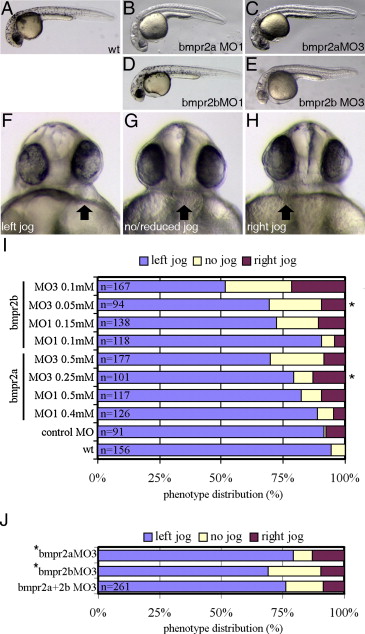Fig. 5 Morpholino (MO) knockdown of bmpr2a and bmpr2b affect normal cardiac jogging. (A) wild type embryo at 32 hpf. Knockdown phenotypes of bmpr2a morphants after injection with bmpr2aMO1 (B) and bmpr2aMO3 (C) and of bmpr2b morphants with bmpr2bMO1 (D) and bmpr2bMO3 (E). Gross morphology analysis shows a slight A?P axis shortening and cardiac oedema in bmpr2a and bmpr2b morphant embryos compared to wild type. The heart position in morphant and wild type sibling embryos at 32 hpf was scored as left jog (normal) (F), no jog (G) and right (reversed) jog (H). (I) Quantification of the heart jog defects observed in embryos injected with bmpr2aMO1, bmpr2aMO3, bmpr2bMO1 or bmpr2bMO3. Results are presented as the percentage of embryos which show a correct (left jog) or incorrect (no jog or right jog) heart jog after injection of the correspondent MO. The jog phenotypes were also scored in wild type, non-injected siblings and in embryos injected with the standard control MO. (J) Comparison of heart jog phenotypes induced by double bmpr2a/bmpr2bMO3 (0.25 mM + 0.05 mM) and single bmpr2aMO3 (0.25 mM) and bmpr2bMO3 (0.05 mM) injection. Single MO injections marked (*) are shown in panel I and J. Results are presented as the percentage of embryos which show a correct (left jog) or incorrect (no jog or right jog) heart jog after injection of the correspondent MO. The number (n) of injected embryos and the morpholino concentrations used are indicated in the graph.
Reprinted from Developmental Biology, 315(1), Monteiro, R., van Dinther, M., Bakkers, J., Wilkinson, R., Patient, R., Ten Dijke, P., and Mummery, C., Two novel type II receptors mediate BMP signalling and are required to establish left-right asymmetry in zebrafish, 55-71, Copyright (2008) with permission from Elsevier. Full text @ Dev. Biol.

